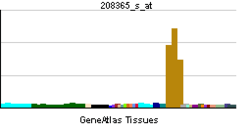GRK4
| View/Edit Human | View/Edit Mouse |
G protein-coupled receptor kinase 4 is an enzyme that in humans is encoded by the GRK4 gene.[4][5]
This gene encodes a member of the guanine nucleotide-binding protein (G protein)-coupled receptor kinase subfamily of the Ser/Thr protein kinase family. The protein phosphorylates the activated forms of G protein-coupled receptors thus initiating its deactivation. This gene has been linked to both genetic and acquired hypertension.[5]
References
- ↑ "Drugs that physically interact with G protein-coupled receptor kinase 4 view/edit references on wikidata".
- ↑ "Human PubMed Reference:".
- ↑ "Mouse PubMed Reference:".
- ↑ Ambrose C, James M, Barnes G, Lin C, Bates G, Altherr M, Duyao M, Groot N, Church D, Wasmuth JJ, et al. (Jun 1993). "A novel G protein-coupled receptor kinase gene cloned from 4p16.3". Hum Mol Genet. 1 (9): 697–703. doi:10.1093/hmg/1.9.697. PMID 1338872.
- 1 2 "Entrez Gene: GRK4 G protein-coupled receptor kinase 4".
Further reading
- Maruyama K, Sugano S (1994). "Oligo-capping: a simple method to replace the cap structure of eukaryotic mRNAs with oligoribonucleotides.". Gene. 138 (1–2): 171–4. doi:10.1016/0378-1119(94)90802-8. PMID 8125298.
- Sallese M, Lombardi MS, De Blasi A (1994). "Two isoforms of G protein-coupled receptor kinase 4 identified by molecular cloning". Biochem. Biophys. Res. Commun. 199 (2): 848–54. doi:10.1006/bbrc.1994.1306. PMID 8135832.
- Premont RT, Macrae AD, Stoffel RH, et al. (1996). "Characterization of the G protein-coupled receptor kinase GRK4. Identification of four splice variants". J. Biol. Chem. 271 (11): 6403–10. doi:10.1074/jbc.271.11.6403. PMID 8626439.
- Bonaldo MF, Lennon G, Soares MB (1997). "Normalization and subtraction: two approaches to facilitate gene discovery". Genome Res. 6 (9): 791–806. doi:10.1101/gr.6.9.791. PMID 8889548.
- Sallese M, Mariggiò S, Collodel G, et al. (1997). "G protein-coupled receptor kinase GRK4. Molecular analysis of the four isoforms and ultrastructural localization in spermatozoa and germinal cells". J. Biol. Chem. 272 (15): 10188–95. doi:10.1074/jbc.272.15.10188. PMID 9092566.
- Suzuki Y, Yoshitomo-Nakagawa K, Maruyama K, et al. (1997). "Construction and characterization of a full length-enriched and a 5'-end-enriched cDNA library". Gene. 200 (1–2): 149–56. doi:10.1016/S0378-1119(97)00411-3. PMID 9373149.
- Lazari MF, Liu X, Nakamura K, et al. (1999). "Role of G protein-coupled receptor kinases on the agonist-induced phosphorylation and internalization of the follitropin receptor". Mol. Endocrinol. 13 (6): 866–78. doi:10.1210/me.13.6.866. PMID 10379886.
- Blaukat A, Pizard A, Breit A, et al. (2001). "Determination of bradykinin B2 receptor in vivo phosphorylation sites and their role in receptor function". J. Biol. Chem. 276 (44): 40431–40. doi:10.1074/jbc.M107024200. PMID 11517230.
- Watanabe H, Xu J, Bengra C, et al. (2003). "Desensitization of human renal D1 dopamine receptors by G protein-coupled receptor kinase 4". Kidney Int. 62 (3): 790–8. doi:10.1046/j.1523-1755.2002.00525.x. PMID 12164861.
- Strausberg RL, Feingold EA, Grouse LH, et al. (2003). "Generation and initial analysis of more than 15,000 full-length human and mouse cDNA sequences". Proc. Natl. Acad. Sci. U.S.A. 99 (26): 16899–903. doi:10.1073/pnas.242603899. PMC 139241
 . PMID 12477932.
. PMID 12477932. - Perroy J, Adam L, Qanbar R, et al. (2003). "Phosphorylation-independent desensitization of GABAB receptor by GRK4". EMBO J. 22 (15): 3816–24. doi:10.1093/emboj/cdg383. PMC 169056
 . PMID 12881416.
. PMID 12881416. - Speirs HJ, Katyk K, Kumar NN, et al. (2004). "Association of G-protein-coupled receptor kinase 4 haplotypes, but not HSD3B1 or PTP1B polymorphisms, with essential hypertension". J. Hypertens. 22 (5): 931–6. doi:10.1097/00004872-200405000-00014. PMID 15097232.
- Gerhard DS, Wagner L, Feingold EA, et al. (2004). "The Status, Quality, and Expansion of the NIH Full-Length cDNA Project: The Mammalian Gene Collection (MGC)". Genome Res. 14 (10B): 2121–7. doi:10.1101/gr.2596504. PMC 528928
 . PMID 15489334.
. PMID 15489334. - Hillier LW, Graves TA, Fulton RS, et al. (2005). "Generation and annotation of the DNA sequences of human chromosomes 2 and 4". Nature. 434 (7034): 724–31. doi:10.1038/nature03466. PMID 15815621.
- Rankin ML, Marinec PS, Cabrera DM, et al. (2006). "The D1 dopamine receptor is constitutively phosphorylated by G protein-coupled receptor kinase 4". Mol. Pharmacol. 69 (3): 759–69. doi:10.1124/mol.105.019901. PMID 16338988.
- Zhu H, Lu Y, Wang X, et al. (2006). "The G protein-coupled receptor kinase 4 gene affects blood pressure in young normotensive twins". Am. J. Hypertens. 19 (1): 61–6. doi:10.1016/j.amjhyper.2005.07.007. PMID 16461192.
- Zhu H, Lu Y, Wang X, et al. (2006). "The G protein-coupled receptor kinase 4 gene modulates stress-induced sodium excretion in black normotensive adolescents". Pediatr. Res. 60 (4): 440–2. doi:10.1203/01.pdr.0000238250.64591.44. PMID 16940246.
- Wang Y, Li B, Zhao W, et al. (2006). "Association study of G protein-coupled receptor kinase 4 gene variants with essential hypertension in northern Han Chinese". Ann. Hum. Genet. 70 (Pt 6): 778–83. doi:10.1111/j.1469-1809.2006.00278.x. PMID 17044852.
- Wang Z, Armando I, Asico LD, et al. (2007). "The elevated blood pressure of human GRK4gamma A142V transgenic mice is not associated with increased ROS production". Am. J. Physiol. Heart Circ. Physiol. 292 (5): H2083–92. doi:10.1152/ajpheart.00944.2006. PMID 17259440.
This article is issued from Wikipedia - version of the 5/25/2016. The text is available under the Creative Commons Attribution/Share Alike but additional terms may apply for the media files.

